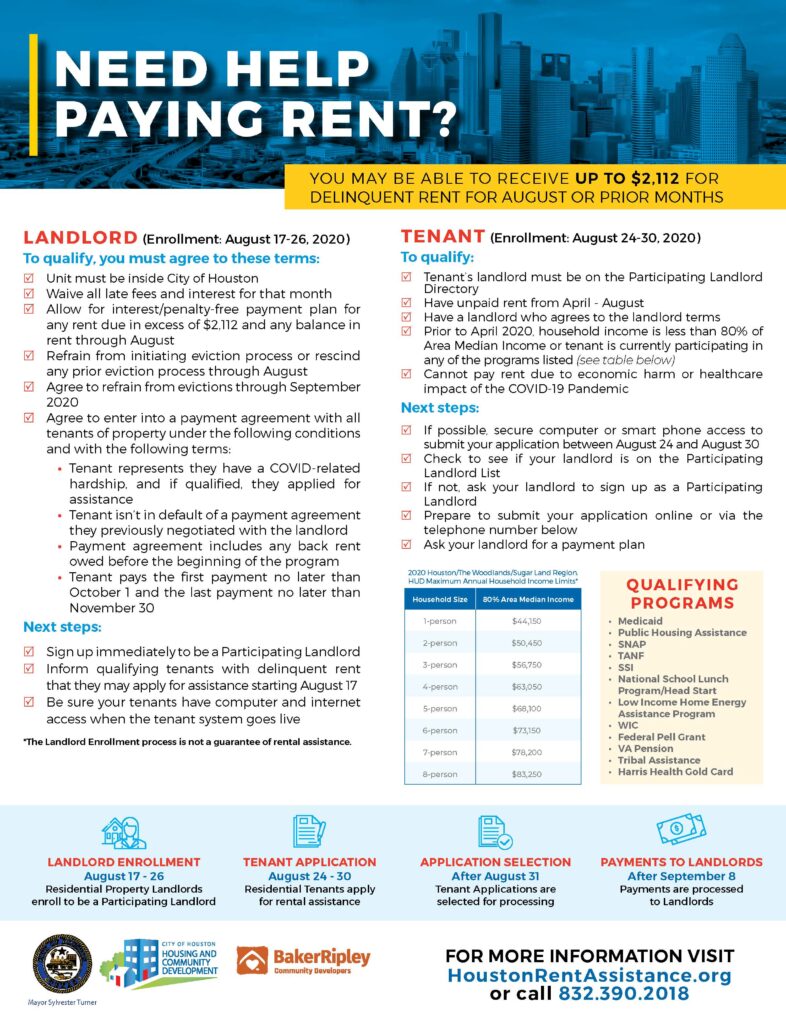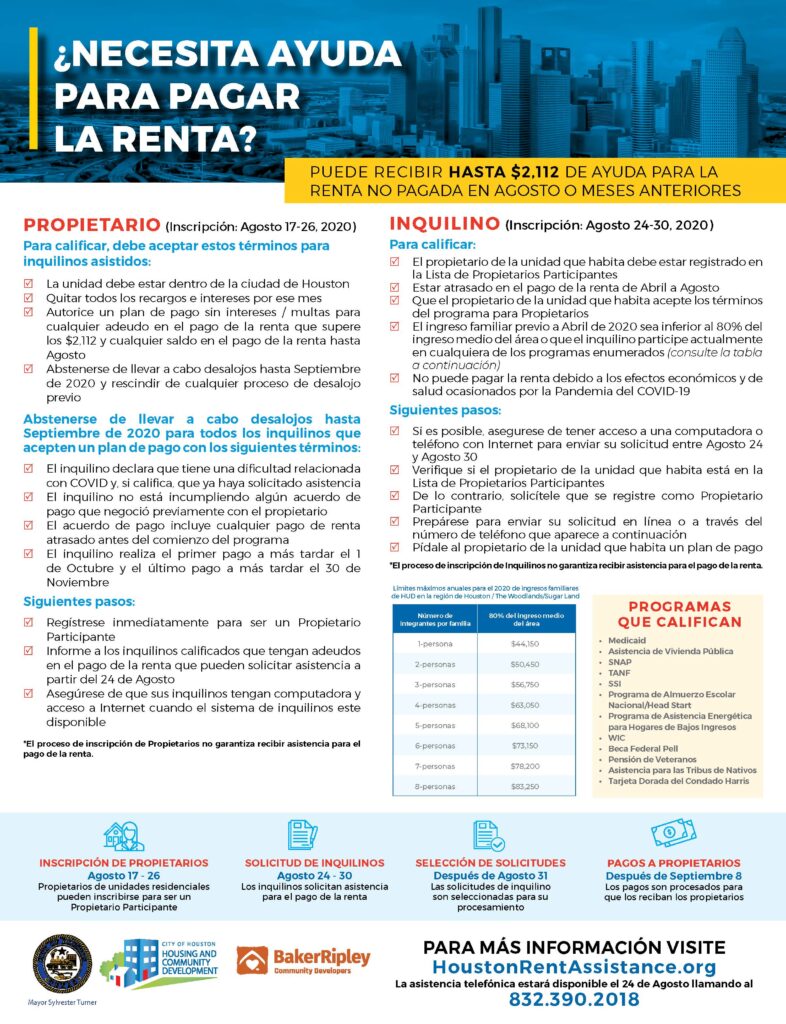Tap on the sections below to learn more about ways you can get help.
For more ways to get help for COVID-19, visit the COVID-19 Resources page.
Economic Relief
Amid an unprecedented health crisis, Mayor Sylvester Turner announced a second rental assistance package to help those who lost their jobs and are struggling financially and cannot pay their rent because of COVID-19.


The Office of Business Opportunity (OBO) has a resource page for businesses on its website.
OneStar Foundation is currently not accepting requests for funding at this time. OneStar announced $920,000 in grants awarded from the Texas COVID Relief Fund on Friday, July 31, 2020. Additional rounds may be announced if funds become available.
EXTENDED: For health & safety reasons, Houston will NOT turn off your water for nonpayment (however, if not paid, late fees may apply on future bills). Call Customer Account Services at 713-371-1400 with questions about water service.
The National Digital Inclusion Association has published a website for free and low-cost internet plans to support households who do not have internet access.
HILSC has compiled a list of resources to provide information on the current pandemic, connect community members to local resources and amplify self-care tools as social distancing goes into effect.
Houston Furniture Bank provides families in need with essential furniture items. They even offer furniture selection appointments every day.
Texas consumers have a new financial backstop to avoid electricity disconnection during the COVID-19 coronavirus quarantine.
If you need help paying bills, the Texas COVID-19 Electricity Relief Program can help. This program is designed to help those who can’t pay bills due to unemployment or economic hardship caused by COVID-19.
Here are FAQs on the Texas COVID-19 Electricity Relief Program (CERP) and how to apply.
Economic Recovery
City
The Greater LGBT Chamber of Commerce has gathered resources to help LGBTQ+ workers, employers, and job owners.
The Houston Arts Alliance has compiled a list of resources to help artists and non-profits navigate the COVID-19 pandemic.
HAA has also launched a survey designed to collect information about the financial and human impacts that the spread of the coronavirus have had on arts and cultural organizations and artists since that date. The survey also collects basic information about the participating organizations and artists so that the data can be parsed by specific geographic regions, artistic disciplines, and budget categories.
View the Office of Business Opportunity’s list of COVID-19-related resources.
State
These are challenging times for businesses all over the nation. The Texas Comptroller’s office knows that during periods of economic hardship, paying or remitting taxes and fees on time can feel like an extra burden when there’s so much uncertainty. We’re thankful to those businesses that were able to remit state and local sales taxes they collected from customers in February on the March 20, 2020, due date.
We understand that virtually all of our taxpayers are doing their best to remain in compliance and be responsible in submitting the taxes they collected from their customers. With that in mind, our agency is here to offer assistance to those businesses that are struggling to pay the full amount of sales taxes they collected in February.
For businesses that find themselves in this situation, our agency is offering assistance in the form of short-term payment agreements and, in most instances, waivers of penalties and interest.
We ask that you contact our Enforcement Hotline at 800-252-8880 to learn about your options for remaining in compliance and avoiding interest and late fees on taxes due.
In addition, we have a variety of online tools for businesses seeking assistance. See our COVID-19 emergency response webpage for access to online tools, tutorials and other resources for tax services, and to establish 24/7 online account access with Webfile.
We’re standing by to help Texas businesses during these difficult times.
The Public Utility Commission of Texas has temporarily suspended a series of rules pertaining to the provisions for utility industry participants to disconnect service for non-payment. They also created the COVID-19 Electricity Relief Program, a funding mechanism through which Retail Electric Providers (REPs) may recover a reasonable portion of the cost of providing those uninterrupted services to customers facing financial hardship.
Customers at risk of disconnection because of COVID-19-related unemployment should first contact their Retail Electric Provider to request a deferred payment plan.
Federal
The Federal Emergency Management Agency (FEMA) is extending the grace period to renew flood insurance policies from 30 to 120 days. This move is to provide relief to the National Flood Insurance Program (NFIP) customers who may be experiencing financial hardships during the coronavirus pandemic. Read more on the FEMA website.
Fannie Mae, Freddie Mac (the Enterprises) and the Federal Home Loan Banks are taking steps to help people who have been impacted by the coronavirus. If your ability to pay your mortgage is impacted, and your loan is owned by Fannie Mae or Freddie Mac, you may be eligible to delay making your monthly mortgage payments for a temporary period, during which:
- You won’t incur late fees.
- You won’t have delinquencies reported to the credit bureaus.
- Foreclosure and other legal proceedings will be suspended
Read more about the FHFA’s COVID-19 related response on the FHFA website.
The U.S. Small Business Administration is offering designated states and territories low-interest federal disaster loans for working capital to small businesses suffering substantial economic injury as a result of the Coronavirus (COVID-19).
Applicants are encouraged to apply online for a disaster loan. If you do not have access to a computer or smartphone, please call us at 1‐800‐659‐2955 for assistance.
The U.S Department of Labor has announced new guidance outlining flexibilities that states have in administering their unemployment insurance (UI) programs to assist Americans affected by the current outbreak of COVID-19. Under the new guidance, states have significant flexibility to amend their laws to provide UI benefits in multiple scenarios related to COVID-19.
In Texas, this means those food service staff, artists and performers affected by the outbreak MAY be eligible for Disaster Unemployment Assitance (DUA), which provides unemployment benefits for individuals as a direct result of COVID-19. Learn more at the U.S. Department of Labor’s website.
The IRS has established a special section focused on steps to help taxpayers, businesses and others affected by the coronavirus. This page will be updated as new information is available.
Under the nationwide emergency declaration for COVID-19, and subsequent major disaster declarations, certain private non-profit (PNP) organizations are eligible to apply for funding through FEMA’s Public Assistance program. This fact sheet provides guidance for determining the eligibility of PNP applicants and work performed in accordance with the COVID-19 emergency and major disaster declarations.